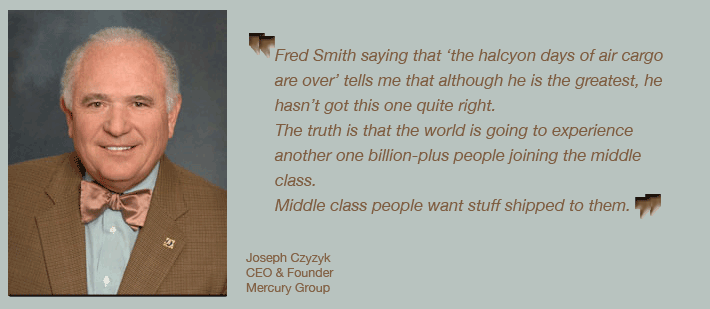
The great Joseph Czyzyk, CEO & Founder
of Mercury Group Los Angeles, was present during the “Supply Chain”
track at IATA World Cargo Symposium in Los Angeles last week to deliver
some words.
Jo Frigger, CEO of EMO Trans, another
self-made man who went out and built a big international logistics company
from humble beginnings off the main runways of JFK on a street called
Rockaway Boulevard, set the table for the discussion as moderator at
World Cargo Symposium, and was followed by presentations from UPS, Intel,
and Hewlett Packard.
We heard a stream of corporate presentations
and were ready to listen for comments from some men who have built their
own companies and in that effort can offer a perspective that comes
from a top executive; “straight from the horse’s mouth,”
as it is said.
Jo Frigger’s time in front of the
audience was brief, but right away he painted a precise picture that
brought to the room of about 50 people to attention, as he likened the
clear lines needed for the betterment of the transportation chain to
the clean, simple, and direct design pioneered at Bauhaus in Dresden,
Germany, 100 years ago.
“Today, the clean lines of the big
buildings all around us here is Los Angeles remind us that transportation
is most effective when it is simple and direct,” Jo says.

As one Jo spoke, the other Joe looked
about the room and smiled across the table.
We wonder what stuck in his mind about
this WCS gathering in Los Angeles.
“Fred Smith saying that ‘the
halcyon days of air cargo are over’ tells me that although he
is the greatest, he hasn’t got this one quite right,” Joe
Czyzyk says.
He is referring to the keynote speech
given by the founder and CEO of FedEx at the grand opening session of
the WCS event last Tuesday.
“Smith appears to have a very short
to medium range outlook that is understandable in his business, but
his medium to long term range outlook for air cargo will not materialize
as he thinks.
“The truth is that the world is
going to experience another one billion-plus people joining the middle
class in the next decade from the emerging nations.
”And what is the definition of someone
from the middle class?
“It is someone who not only subsists,
but has a few bucks to purchase an iPad, get on an airplane, and in
the larger picture be someone who will want stuff shipped to them.”
“Maybe in the short term air cargo
is taking a hit whilst experiencing a bit of flattening out.
“Given the realities of our global
future, I think that air cargo will as an industry keep moving on and
will grow into an even greater business.”
Joe Czyzyk was born in Poland, the son
of Holocaust survivors; he traveled Europe as a toddler and grew up
in Canada.
His parents moved to the U.S. when he
was 16 years old and he became a U.S. citizen.
Three members of the legendary World War
II First American Volunteer Group (AVG), the Flying Tigers—Thomas
C. Haywood, Robert P. “Duke” Hedman, and Robert J. “Catfish”
Raine—founded Los Angeles-based Mercury Air Group, Inc. in 1956.
Joe joined Mercury in 1984 to establish
the company’s cargo division. As Chairman of the Board, he privatized
the company in 2006, after nearly three decades on the American Stock
Exchange.
From extensive travels to every part of
the globe, but with a special emphasis on South America, Asia, and the
Middle East, Mr. Czyzyk has deep international relationships that have
allowed Mercury to expand far beyond its Los Angeles headquarters.
About Freighters
“In the early 1970s when the first
747 air cargo freighters were introduced on nonstop transatlantic and
transpacific flights, the barrel of oil was at $12, the amortization
or depreciation for a 747 was $250k per month, fully allocated operating
cost were approx $5,000 per hour, the cost of warehouse and ramp labor
was $5 per hour, and the air cargo rates were between $1.50 and $2.00
per kg in either direction for a transatlantic flight.
“Today, all of those costs have
tripled, quadrupled, and fuel has multiplied 8 times, but only one of
those numbers has remained the same and in many cases has even decreased.
“Of course, that's the rate per
kg without even adjusting the present day value of money.
“So it's natural that so many airlines,
with a few exceptions, are looking to reduce or completely eliminate
their freighter fleets.
“While more than half of the air
cargo in the world is flown in the bellies of passenger aircraft and
that percentage will continue to grow over the decades, there will be
less and less incentive for combination carriers to artificially adjust
their tariffs to support their freighter fleets.
“It will be more accretive for them
to park their freighters, as many have already done.
“Another one of our customers with
a full passenger load flew its A380 nonstop to Dubai and carried more
than 18 tons of cargo in their belly while their triple 7 carried 25
tons.
“It’s obvious that air cargo
pricing will become more and more influenced by passenger carriers.
“The operating costs of a passenger
carrier on a ton/kilometer basis will remain more flexible, profitable,
and their reliability and frequency will continue to outpace the all
cargo carriers.
“So what's the future of the freighters:
There will always be a need, but survival and profitability will require
higher pricing e.g. for shipments exceeding 2.4 meters in height, very
heavy shipments, charter work, government, Aerospace, and specialized
shipments, but certainly less of them flying on scheduled routes, and
I suspect that Boeing will eventually shut down its freighter manufacturing
lines over the next decade, as the demand decreases.”
Predictions
“I predict that, except for the
integrated package delivery carriers, there will be no growth and most
probably a progressive reduction of freighter operations from LAX, simultaneous
with international tonnage increasing over the next decade.
“Today in our business, where my
company provides warehousing services for international airlines, we
are analyzing that eventuality and its impact on our business.
“More and more of our systems are
becoming geared towards accommodating the cargo preparation, loading,
and delivery systems for passenger flights.
“Let's face it, more and more people
are traveling by air and as the next billion earth inhabitants (as mentioned
earlier) join the middle class over the next decade, many of them will
want to fly and that sheer growing demand for passenger travel will
provide a tremendous abundance of additional air cargo capacity without
adding many more freighters.
“Of course my comments need a ‘safe
harbor’ statement, and just as Fred Smith pointed out in his keynote
remarks at WCS last week, because all predictions are theory and certain
future events such as simple acts of aviation terrorism or a dramatic
reduction in the price of jetfuel can easily invalidate these predictions.”
Geoffrey
|



